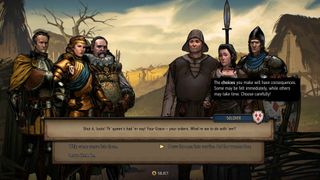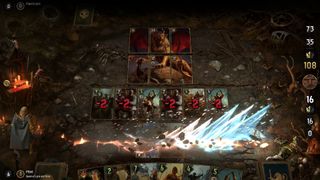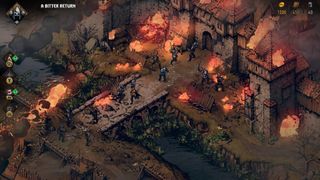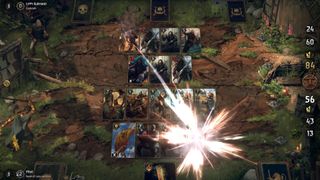Thronebreaker Is A Solid Spin-Off for Witcher Fans
Thronebreaker: The Witcher Tales is a meaty single-player RPG with strategic gameplay, a complex narrative and gorgeous graphics.
Last month, CD Projekt Fan surprised (and delighted) Witcher fans worldwide by announcing Thronebreaker: The Witcher Tales. Right off the bat, a few things looked different.

Players would battle monsters with Gwent cards instead of swords and Signs; the game would be a top-down isometric adventure rather than a full 3D world; and players would control Queen Meve of Lyria rather than recurring protagonist Geralt of Rivia. But this didn't seem to bother most players; they knew that CD Projekt Red would deliver something good.
MORE: Best Single-Player Games
And, and far as I can tell, the Polish developer has not disappointed. While it's not exactly a traditional Witcher installment, Thronebreaker ($30; Oct. 23 on GOG, Dec. 4 on PS4 and Xbox One) is still a meaty single-player RPG with strategic gameplay, a complex narrative and gorgeous graphics. The game expands on the fascinating world from Andrzej Sapkowski's brilliant books, and rewards fans who paid close attention during the three Witcher games.
Best of all, Thronebreaker represents a new way to see the Witcher setting: through the eyes of royalty and everyday soldiers, rather than a superpowered monster hunter.
Having spent a few hours with Thronebreaker, I'm not quite hooked beyond all doubt yet, but I’m ready to go back whenever I get some spare time. The game is relaxing and easy on the eyes, and it's always a treat to spend a few more hours in the Northern Kingdoms. On the other hand, learning the basics can require quite a bit of trial and error, and overworld exploration is a little too slow, especially early on.
Like the previous Witcher games, Thronebreaker demands a little patience up-front before it gets really good. But if you can give it that, it'll reward you with a satisfying, self-contained adventure.

Lay down your cards
Sign up to get the BEST of Tom’s Guide direct to your inbox.
Upgrade your life with a daily dose of the biggest tech news, lifestyle hacks and our curated analysis. Be the first to know about cutting-edge gadgets and the hottest deals.
Thronebreaker begins shortly after the events of Blood of Elves, the first standalone Witcher novel. Without going into great detail about the story (it's good), Queen Meve returns from a meeting of Northern Kingdoms rulers to find her kingdoms of Lyria and Rivia in disarray. And, as a proactive Queen, she decides to lead her forces in battle against the local bandits – which, of course, spirals into something bigger.
You won't control Meve and her forces in an RPG or RTS combat style. Instead, you'll play Gwent: the beloved card game from The Witcher III: Wild Hunt, which got its own multiplayer spinoff. (And yes, you do unlock multiplayer Gwent cards as you complete Thronebreaker missions.) It makes sense that Meve wound send squadrons of soldiers against ghouls and bandits rather than do all the dirty work herself, and there's even a framing story that reveals why every character seems content to resolve their problems through Gwent rather than, say, actually swinging a sword.
If you've played Gwent before, you don't need me to tell you why it's so addictive, or so satisfying. If you haven't, though: It's a little like Magic: The Gathering, and a little like rummy. You build a deck full of soldiers, monsters, spells, equipment, leaders and other trappings of the Witcher world. Every card is worth a certain number of points, and usually has an ability to either bolster your own side's points, or whittle away at your enemy's.
Your goal is to get a higher score than your opponent in two out of a possible three rounds. That's really all there is to it – but of course, there's plenty of strategy involved if you want to come out on top. From deck construction, to leader ability cooldowns, to purposely forfeiting rounds in order to preserve cards, there's a lot of strategy in Gwent, especially since Thronebreaker has way more cards than The Witcher 3.
That's why it's a little disappointing that in the first few hours of Thronebreaker, the vast majority of Gwent battles aren't traditional three-round deck-vs.-deck battles, but instead, puzzle fights. Instead of simply pitting your deck against an opponent's, Thronebreaker makes almost every fight into a puzzle. It's not about combining your units in clever ways to boost your score; you suddenly need to defeat every enemy ghoul simultaneously, or destroy certain units before disappear from the battlefield, or keep all of your units alive.
These puzzles are generally fun – or at least keep you on your toes – but I think they might work better as occasional set pieces rather than focal points. It's hard to feel that attached to your deck and your strategy when you usually need to play exactly how Thronebreaker dictates.

Take it slow
When you're not taking part in Gwent battles or story cutscenes (you can choose your responses, which has a big impact on how the narrative plays out), you'll control Meve as she explores the roads, towns and forests of Lyria. There's a very pleasant, Diablo-style isometric map, and you can bring Meve just about anywhere, finding resources, hidden keys and side quests as you go.
The good news is that the world is suitably big, and Meve can find a lot of useful stuff by straying off the beaten path, from gold to new cards. The bad news is that Meve walks very, very slowly, and CD Projekt Red hid a lot of the best items down very obscure, winding, hard-to-reach paths. I get that there has to be some kind of effort involved in finding a secret, or else it's not really a secret, but Thronebreaker often makes you go far out of your way for a meager reward.
On the other hand, it is cool that you get to explore a big, interconnected kingdom, and use the resources you find to level up Meve and her Gwent abilities. It would have been extremely easy to pitch Thronebreaker as a series of interactive cutscenes and Gwent battles, but having a whole world map to explore makes it feel like a full-fledged role-playing game.

The next few hours
So far, Thronebreaker seems like a solid bet for Witcher fans, as well as a worthwhile complement for the Gwent multiplayer crowd. I don't think it's going to take the gaming world by storm like The Witcher 3 did, but it's also not really designed to. It's a well-designed brain-teaser of a game, with lots of lore and enough extras to warrant a thorough playthrough. Hopefully, the first Witcher Tales game won't be the last.
Marshall Honorof is a senior editor for Tom's Guide, overseeing the site's coverage of gaming hardware and software. He comes from a science writing background, having studied paleomammalogy, biological anthropology, and the history of science and technology. After hours, you can find him practicing taekwondo or doing deep dives on classic sci-fi.

